List of Authors
>>About this blog
Recent blog post
|
[Dimini ☆ Cricket]
Nov. 30, 2015 16:00
[Kra-san]
Nov. 30, 2015 12:00
The Doburoku Festival is an event derived from Niiname-no-Matsuri, which appreciates the good harvest of new grains, and was held at Koami Shrine in Nihonbashikoamicho on November 27 (Friday).
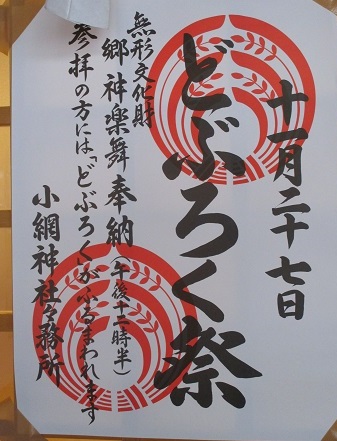 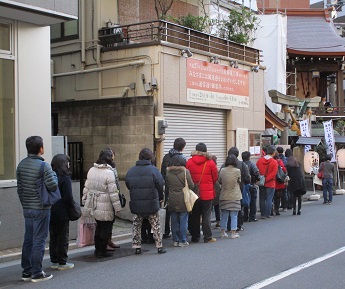 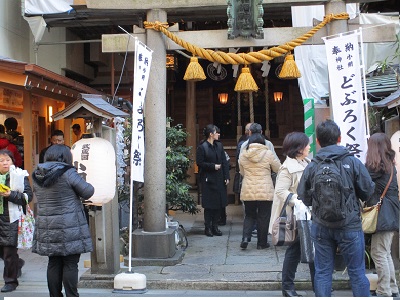
This festival is especially popular as the "Doburoku Festival" because it acts to worshipers in Doburoku (Nigori sake made from fresh rice harvested in the year at Shinryoda), which is offered to Jinmae along with new grains.
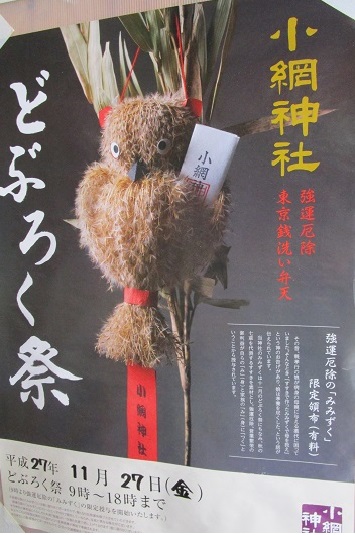 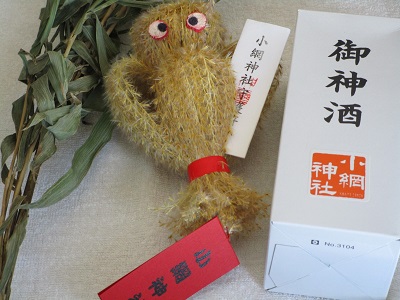
On the day of the festival, a festival was held in shrine hall from 9 o'clock in the morning, and a long line was formed due to the limited distribution of a bottle of sacred wine and the mischief of good luck.
Koami Shrine is enshrined at Koami Manpukuji Temple built in the Muromachi period, and has been worshiped as a god of fortune and prosperity of business, which is said to have originated from Inari Shrine. After the visit, Mr. Miko advised me to doburoku.
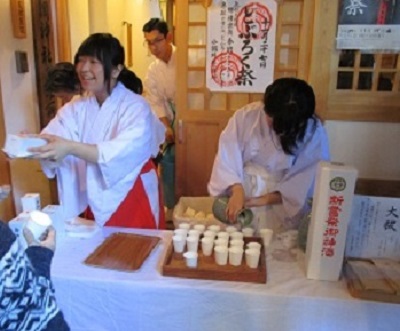
In the past, when the daughter of filial piety was in trouble with the medicine to give to the sick mother, the god told me that `` save the mother with the mizuku made with sosuki ''. It is said that the daughter did filial piety to her mother. "Mimizuku" is based on "Susuki", a representative of the seven herbs in autumn, based on the Doburoku Festival in November, and the benefits of exorcism and thriving business are said to be "Tsuku" to their own "Mi" (body). It seems to have been awarded.
In addition, after noon, "Sato Kagura Dance" from the nationally designated Intangible Cultural Property was dedicated to Kamimae.
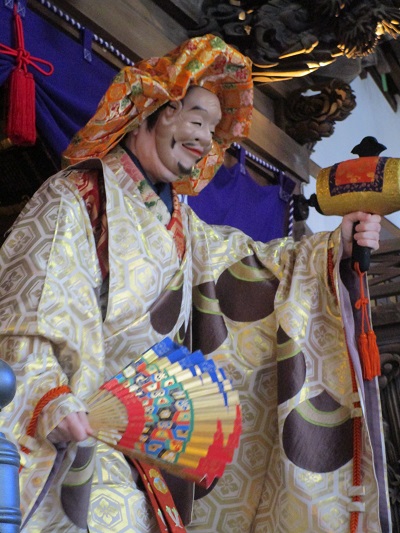
The "Doburoku Festival" next year (2016) of Koami Shrine, one of the two major doburoku festivals in Kanto, will be November 28 (Monday).
[Many Books]
Nov. 30, 2015 09:00
November 28 Participated in "Learn the world of Kabuki from the backside of Kabukiza and Kibikicho Plaza and from the props" jointly planned by the Chuo-ku Tourism Association and Pokekaru Club. At 9:50, we gathered at Kabuki Inari Daimyojin. A total of 20 people. The group was divided into two groups, and the first group was guided by Mogi of Kabukiza Service Co., Ltd., and the second group was guided by Nishimura. . In the morning, we descended underground from the front of Kabukiza and looked around the shop of "Kibikicho Square".
 
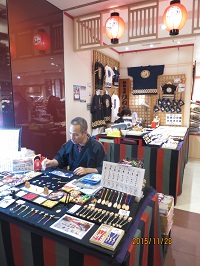 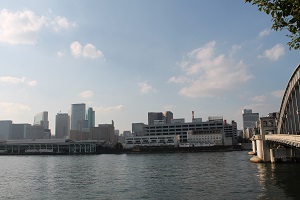
From the left to the front of the Kabukiza Theater with decorations on the first day of December 2. Kumatori's "face pack". "Good luck hammer" of "Hinemosu". I bought it as a souvenir.
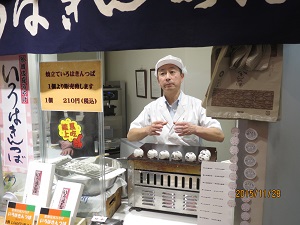 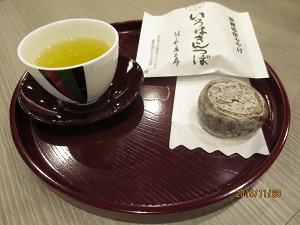
"Iroha Kintsuba"'s demonstration, a snack at 3:00 was served with Atatsu Kintsuba. It was very sweet and delicious. This is also purchased as a souvenir. In the name of "Iroha", he talked about Professor Toshio Kawatake's naming because the seat order of Kabukiza was "Iroha", and talked about Kintsuba.
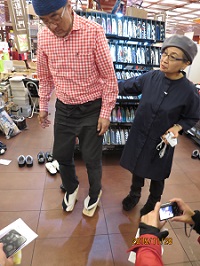
The photo above is where you are wearing a single tooth clog. It's hard to balance. I was able to try it.
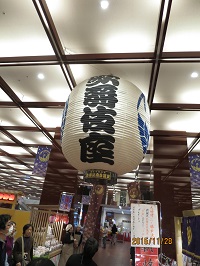 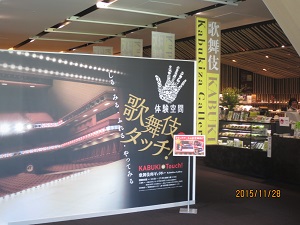
The upper part is a large lantern located in Kiboricho Square. Height 2.2mx diameter 1.9m. Go up to the 5th floor to see the Kabukiza Gallery. Explore the back side of Kabukiza at VIDEO guided by Somegoro. It was good to see the backside which was hard to see.
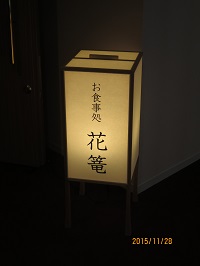 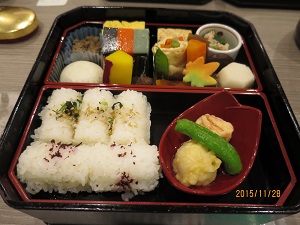
Lunch at "Hanago" (chartered) on the third floor. Mr. Tokaibayashi, the head chef, explained the contents of the lunch box. It is said that the lunch box from the Edo period was restored. However, the amount of rice was half that of that time, and the seasoning seemed to be deeper in the Edo period. At the top of the middle is a kamaboko that imitates a formal curtain, which is colored with "black sesame, kuchinashi, spinach". It was delicious.
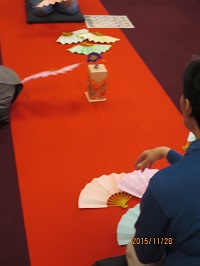
After the lunch box, challenge "Subling fan" and "Kendama".
It seems simple and this is quite difficult.
It is possible to hit it, but the score is low alone, and it seems that a high score can be obtained by the relationship between the target on the box and the fan falling.
Everyone was enjoying it.
"Kendama" was also challenging.
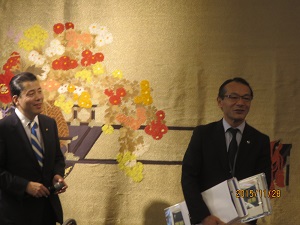 After the game, there was talk about stage equipment and props by Adachi of Kabukiza Stage Co., Ltd. (right). After the game, there was talk about stage equipment and props by Adachi of Kabukiza Stage Co., Ltd. (right).
It seems that the company will start in 1655.
Kanbee Hasegawa, an example, appears in the history of Kabuki during the Edo period, is the first one.
On the left is Mogi of Kabukiza Service Co., Ltd., and he himself seems to have a connection to Kabukiza for generations.
Kabuki is still supported by tradition.
With such a tour content, 5 hours passed quickly. Will the viewpoint of seeing Kabuki be a little different from now on?
In addition, "Kiboricho Plaza" is said to be evacuation site for those who cannot return home in the event of a disaster. I forgot the exact number, but it seems that a considerable number of people can be accommodated.
More Kabukiza Tour
[Marsha Horiuchi of Edo]
Nov. 28, 2015 14:00
A special exhibition commemorating the 50th anniversary of the Mitsui Bunko and the 10th anniversary of the Mitsui Memorial Museum.
As the second installment in spring, it will be held at the Mitsui Memorial Museum in Nihonbashi until the end of January next year.
During the Edo period, as a Matsuzaka merchant in Ise, he set up a store in Nihonbashi (Otemmacho → Surugacho) and a kimono shop.
And as a money exchanger, through the turbulent period of late Tokugawa shogunate and Meiji, today
It can be said that the traditional heirlooms collected up to the point gathered together.
As if you look at the microcosm of traditional Japanese culture, you can see the tea ceremony, domestic and foreign paintings, calligraphy, and mail.
It is followed by stamps from the beginning of the Meiji era, and the "Yukimatsuzu" of Oukyo Maruyama, a national treasure, and Noh mask.
Why don't you visit as a calming place during the busy year-end and New Year holidays?
12th to 13th centuries of the 13th century, an important cultural property
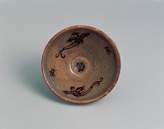 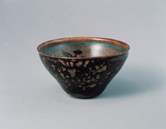
Important Cultural Property Karamono Shoulder Chairi Kitano Shoulder Minami Soong Period, 12th to 13th centuries
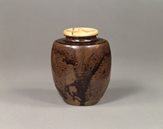
Important Cultural Property Nikko Matsuzuru Figure Screen Muromachi period, 16th century exhibition period January 5-January 23 (left vessel, right vessel)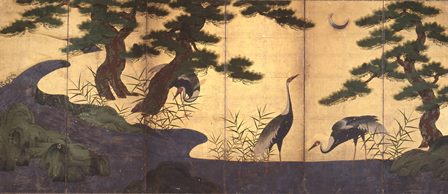
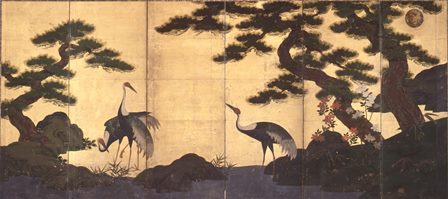
Important Cultural Property Tofukumon-in entrance screen (part) Edo period, 17th century
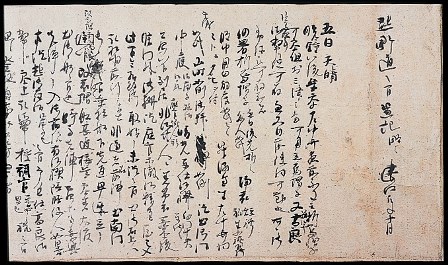
National Treasure Kumano Miyukiki Sadaie Fujiwara brushed Kamakura period, 1201 (1201)
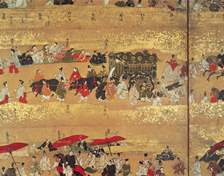
Confucius Temple, Tang dynasty, Jogan 2-4 (628-630)
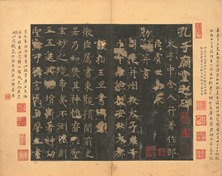
Hand carving stamp Japanese paper cherry blossoms 20 yenMeiji period
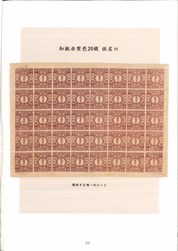
National Treasure Snowmatsu Figure Screen Oukyo Maruyama Brush Edo period, 18th century (left from the top, right)
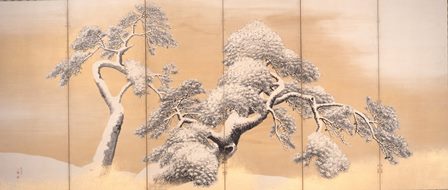
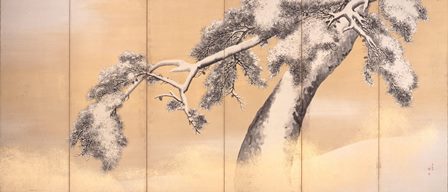
National treasure dagger Mumei Masamune famous Masamune Hyuga Masamune Kamakura period, 14th century

Important Cultural Property Nomen Sonjiro Den Sonjiro's work Muromachi period
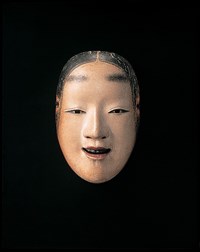
All works will be owned by the Mitsui Memorial Museum.
Mitsui Memorial Museum → The nearest station is Mitsukoshimae Station on the Ginza Line.
Click here for details http://www.mitsui-museum.jp/
※Each image is owned by the Mitsui Memorial Museum. Secondary use is strictly prohibited.
[Silver]
Nov. 26, 2015 20:00
The Chuo-ku Cultural and International Exchange Promotion Association "Gathering of International Exchange 2015" was held at Tsukiji Social Education Center on November 21, 2015.
This event is held once a year to promote cultural exchange between Japanese and foreigners in Chuo-ku and deepen mutual understanding.
I also participate every year, and this is the seventh time this year.
You will receive the reception on the first floor of the venue and proceed to the venue you are looking for. Whatever you say, the first place to eat is  the place to eat. the place to eat.
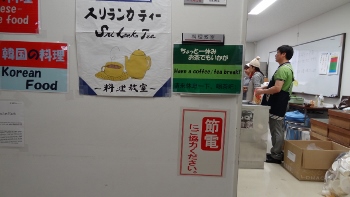
On this day, we had a treat  of Korean Chizumi, Japanese oden, and Sri Lanka milk tea. It was very delicious. of Korean Chizumi, Japanese oden, and Sri Lanka milk tea. It was very delicious.
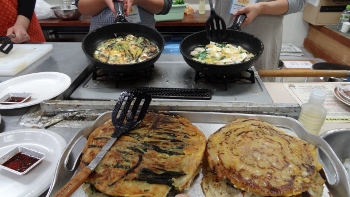 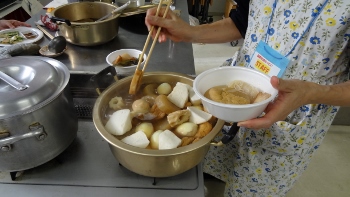
At the time we arrived, the Bon Odori was over and I was sorry that I could not see it.
Then, ink painting experience corner
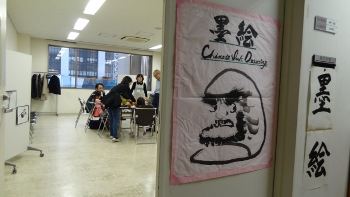
Ikebana corner
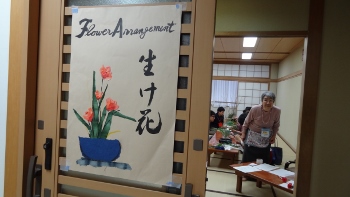
Visit the origami experience corner, etc.
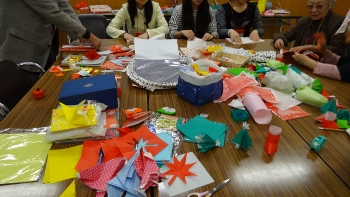
Oh, today there was also a shamisen experience corner. He rushed in . .
The teacher who instructed the moderator's explanation, model performance, and shamisen experience.
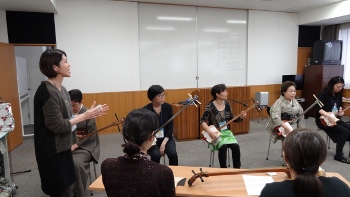
There were about two men who were actively experiencing it. It's a serious expression.
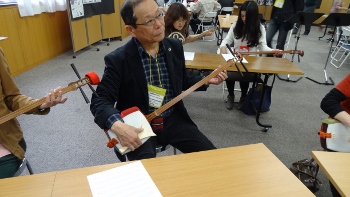
After this, a lot of introduction corners, Spanish flamenco dances, etc. were introduced, but I will report it next time in Part 2.
PS. In December, there seems to be a "tea experience". For more information, look here. http://www.chuo-ci.jp/
<The publication of this article has been approved by the Chuo-ku Cultural and International Exchange Promotion Association.>
[Dye]
Nov. 26, 2015 14:00
It's getting cold at once.
November is about to end, and this year is over, too early!
In many ways, I'm going to get rid of it.
By the way, at Higashi Nihonbashi 3-chome, the annual rice cake competition  will be held on Sunday (29th) this weekend. (Place: in front of Higashi-Nihonbashi 3-chome Children's Park) will be held on Sunday (29th) this weekend. (Place: in front of Higashi-Nihonbashi 3-chome Children's Park)
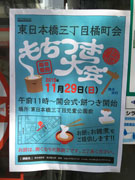
This is from last year.
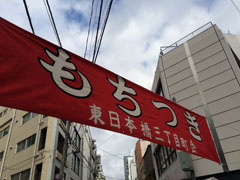 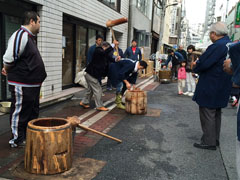
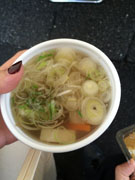 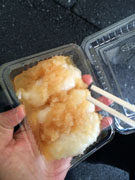 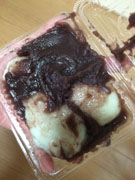
The freshly-made mochi is still delicious. There was also a zoni. There was also a zoni.
In this area, the number of condominiums has increased recently, and many children have come to see them.
The shop people are kind and it is a warm area like a downtown area.
Also, at the Kanda Myojin festival, mikoshi is everywhere, and it is full of liveliness.
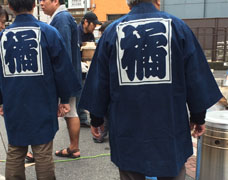
In the past, this area seemed to have been called "Tachibana-cho", and I feel its remnants.
According to my ears, at this time there seems to be such mochi-making competitions in various places in the Nihonbashi area other than Higashinihombashi.
It's cold outside, but my body and mind are warm.
If you are near, please take a look (*^^ *) /
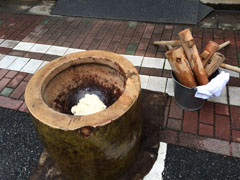
|
Links
|
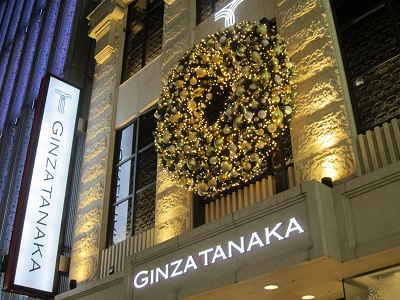 On the first floor of the Ginza main store of GINZA TANAKA (Takashi Tanaka Metal Jewelry Co., Ltd.), a pure platinum Christmas tree
On the first floor of the Ginza main store of GINZA TANAKA (Takashi Tanaka Metal Jewelry Co., Ltd.), a pure platinum Christmas tree ![]() "Disney Cinderella Platinum Christmas Tree" (tax included price: 100 million yen) with the motif of the Disney movie "Cynderella" is exhibited and sold ()
"Disney Cinderella Platinum Christmas Tree" (tax included price: 100 million yen) with the motif of the Disney movie "Cynderella" is exhibited and sold ()![]() Has been done.
Has been done.![]()
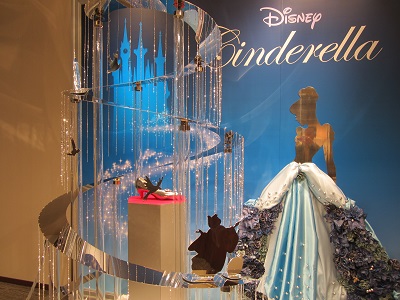 The "Christmas tree
The "Christmas tree![]() " with a height of about 2.5m, says that about 9 kg ()
" with a height of about 2.5m, says that about 9 kg ()![]() pure platinum and about 3ct ()
pure platinum and about 3ct ()![]() diamonds are used, and the spiral part is regarded
diamonds are used, and the spiral part is regarded ![]() as a tree, and a pure platinum pumpkin carriage and wizard silhouette are arranged, and the Cinderella represents the story of Cinderella heading to Cinderella Castle on the treetop.
as a tree, and a pure platinum pumpkin carriage and wizard silhouette are arranged, and the Cinderella represents the story of Cinderella heading to Cinderella Castle on the treetop.![]()
![]() is a pure platinum "glass shoes" designed with a 3ct diamond placed in
is a pure platinum "glass shoes" designed with a 3ct diamond placed in ![]() the center of the tree.
the center of the tree.![]()
![]()
![]()
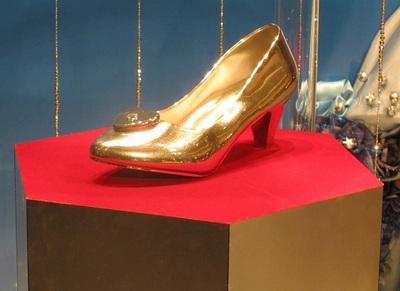 The exhibition period is from Thursday, November 19 to December 25 (Friday).
The exhibition period is from Thursday, November 19 to December 25 (Friday).![]()
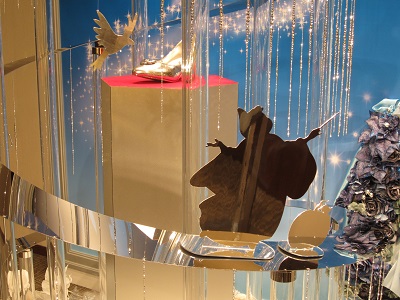 During the same period, a "Cinderella" corner is set up to display and sell a total of 5 items, including "Cinderella"-related jewelry and hand mirrors.
During the same period, a "Cinderella" corner is set up to display and sell a total of 5 items, including "Cinderella"-related jewelry and hand mirrors.![]()
![]()
![]()
![]()
![]()
![]()
![]()


































